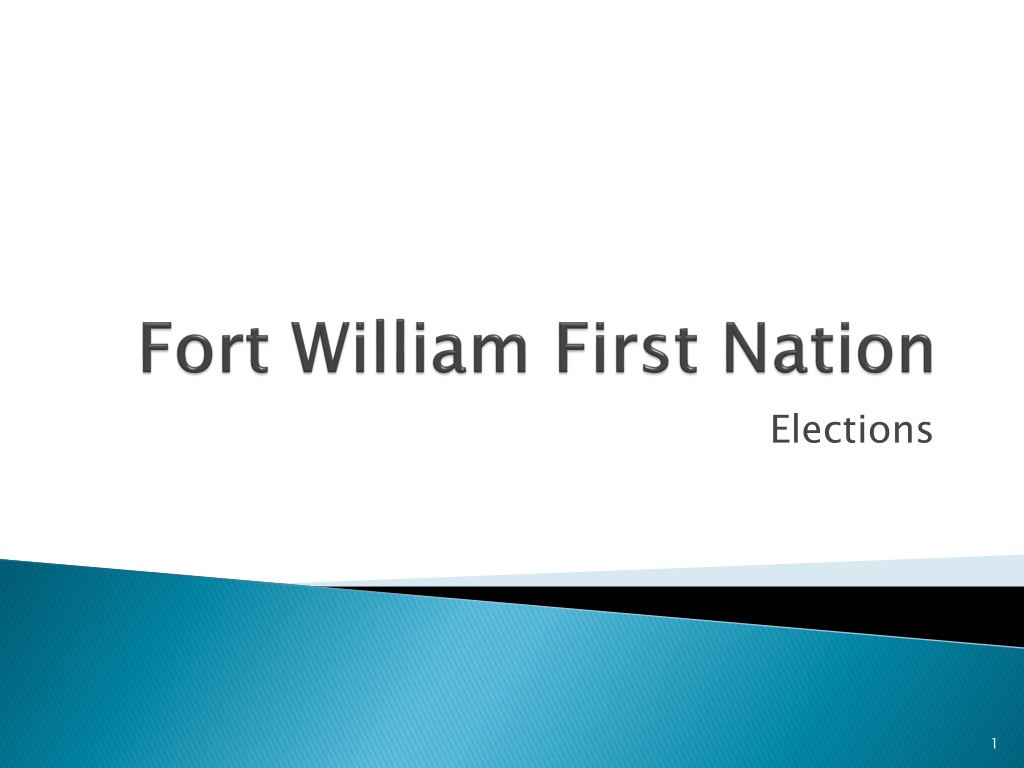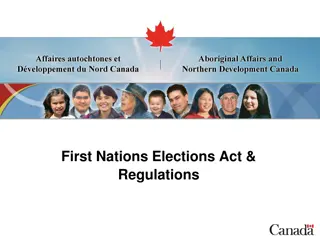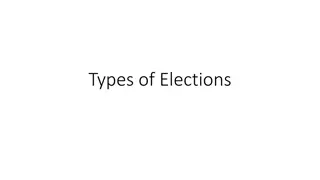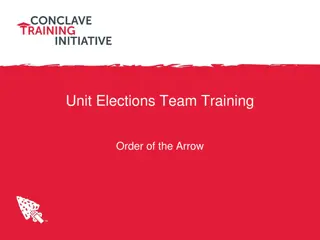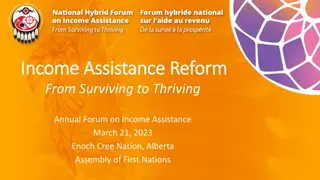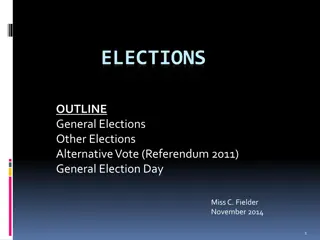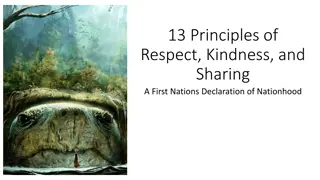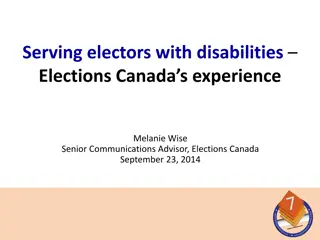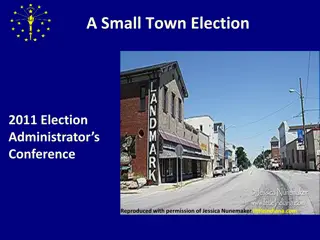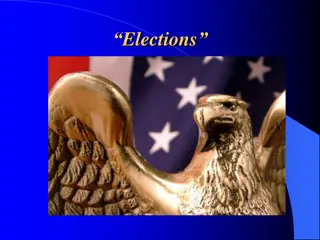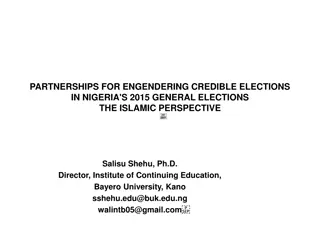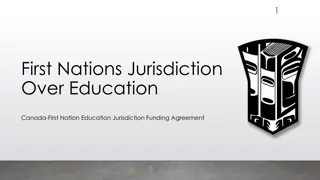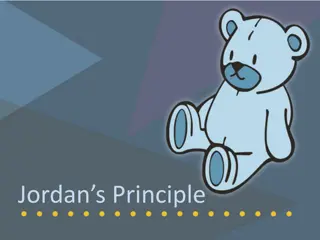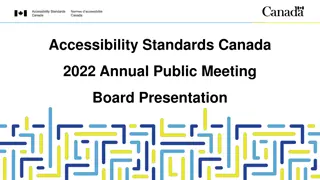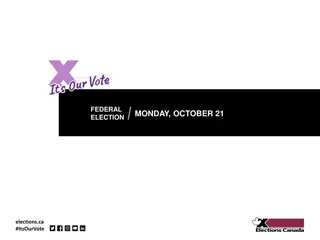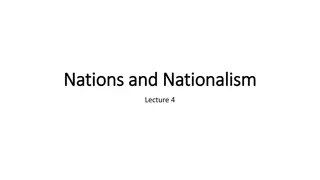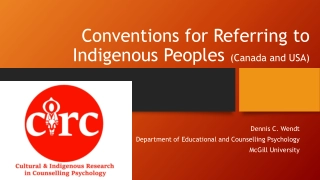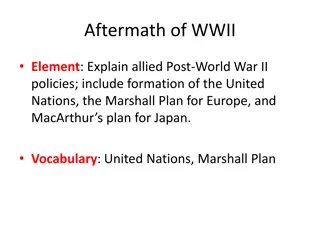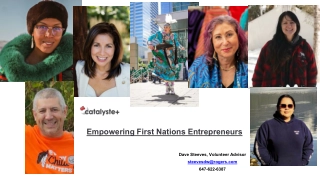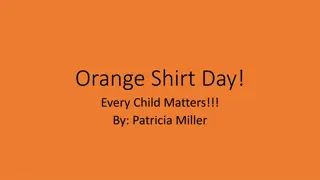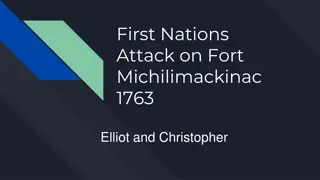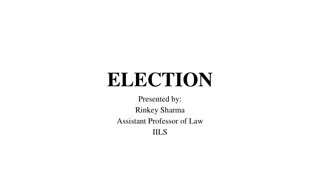Understanding First Nations Elections in Canada
First Nations governments in Canada are formed by chiefs and councillors who make decisions on behalf of their communities. Elections can be held in different ways, such as under the Indian Act, through community leadership selection processes, or pursuant to self-government agreements. The process involves appointing electoral officers, nominating candidates, voting, and declaring elected officials. The role of Indigenous and Northern Affairs Canada in these elections, including handling appeals, is also outlined.
Download Presentation

Please find below an Image/Link to download the presentation.
The content on the website is provided AS IS for your information and personal use only. It may not be sold, licensed, or shared on other websites without obtaining consent from the author. Download presentation by click this link. If you encounter any issues during the download, it is possible that the publisher has removed the file from their server.
E N D
Presentation Transcript
First Nations governments are formed by a chief and councillors who are responsible for making decisions on behalf of the First Nation and its members. The election of a chief and councillors can be held in one of four ways: 1) by following the steps outlined in the Indian Act and the Indian Band Election Regulations 2) under a community leadership selection process (often called "band custom") 3) pursuant to a community's constitution contained in a self-government agreement 4) under the new and optional First Nations Elections Act Approximately 235 First Nations in Canada hold elections under the Indian Act and the Indian Band Election Regulations, 38 are self- governing, while the remaining First Nations select their leaders according to their own community or custom leadership selection process. As the First Nations Elections Act has only recently come into force, First Nations are just now beginning to have the conversation about whether this new election system suits their needs. 2
All First Nations who hold their elections under the Indian Act are subject to the same rules and eligibility requirements, and hold elections every two years. Some highlights of a typical election under the Indian Act include: the appointment of an electoral officer (which must be approved by the Minister of Indigenous and Northern Affairs Canada) to manage the overall election process and all related activities; the holding of a meeting where electors can nominate candidates for the chief and councillor positions voting in person on reserve and by mail-in ballot counting of the votes and declaration of elected candidates 3
Unlike a community leadership selection process, where Indigenous and Northern Affairs Canada (INAC) has no role in the process, the department carries out the following responsibilities in elections under the Indian Act and the Indian Band Election Regulations: training and supporting electoral officers throughout the election to ensure compliance with the election rules approving the First Nation council's choice of electoral officer or appointing the electoral officer when there is no First Nation council in place receiving, investigating and deciding on election appeals Candidates or eligible voters have 45 days following the election to file an election appeal with INAC if they feel that there were: corrupt practices in connection with the election a violation of the Indian Act or the Indian Band Election Regulations that might have affected the results of the election a person running who was not eligible to be a candidate 4
Community or custom leadership selection processes are often documented in a community's election code, which provide the rules under which chiefs and councillors are chosen for those First Nations who are not under the Indian Act election rules. These codes vary depending on the First Nation and are often unique to the specific community. INAC is never involved in the election processes held under community or custom election processes, nor will it interpret, decide on the validity of the process, or resolve election appeals. The department's role is limited to recording the election results transmitted by the First Nation. When a dispute arises concerning a community or custom election process, it must be resolved in accordance with the related provisions in a community's election code, or by the courts. For information on the community or custom leadership selection process of a specific First Nation, please consult the First Nation directly. 5
Self-governing First Nations do not fall under the purview of the Indian Act. They establish their own laws and policies in a broad range of matters internal to their communities and integral to their cultures and traditions, including leadership selection. Self-governing First Nations elect their leadership through individual election processes which vary depending on the First Nation and are often unique to the specific community. As with a community or custom leadership selection process, INAC is never involved in the election processes held by self-governing First Nations, nor will it interpret, decide on the validity of the process, or resolve election appeals. The department's role is limited to recording the election results transmitted by the First Nation. For specific information concerning the election processes of a self-governing First Nation, please consult the First Nation directly. 6
The First Nations Elections Act came into force on April 2, 2015. The Act was developed collaboratively with First Nations organizations to bring about real improvements to the election processes of First Nations across the country. This legislation provides a fourth option to First Nations for leadership selection offering an alternative opt-in legislated election system that improves upon and fills the gaps in the Indian Act system. 7
Indian Act First Nations Elections Act Term of office Term of office 2 years 2 years 4 years 4 years Six or more First Nations can coordinate their terms of office and hold their elections on a common day. Common election day for groups of First Nations Qualifications to nominate, and be, a candidate for Chief No provision None Nominees must be a member of the First Nation and be at least 18 years of age on the day of the nomination meeting. 8
Indian Act First Nations Elections Composition of Council Composition of Council One chief and one councillor for every 100 members of the First Nation (minimum of two and maximum of 12 councillors). The Minister can authorize a First Nation to deviate from the number of councillors that would otherwise be mandated by this rule. One chief and one councillor for every 100 members of the First Nation (minimum of two and maximum of 12 councillors). The Minister can authorize a First Nation to deviate from the number of councillors that would otherwise be mandated by this rule. One chief and one councillor for every 100 members of the First Nation (minimum of two and maximum of 12 councillors). The council can decide by resolution to reduce the number of councillor positions. One chief and one councillor for every 100 members of the First Nation (minimum of two and maximum of 12 councillors). The council can decide by resolution to reduce the number of councillor positions. A nominee must be a member of the First Nation and be at least 18 years of age on the day of the nomination meeting Qualifications to nominate, and be, a candidate for Councillor A nominee must be a member of the First Nation and be at least 18 years of age on the day of the nomination meeting To be eligible to vote, a person must be a member of the First Nation and be at least 18 years of age on election day. Qualifications to vote To be eligible to vote, a person must be a member of the First Nation and be at least 18 years of age on election day 9
Indian Act First Nations Elections Act Rules and procedures for the nomination of candidates Rules and procedures for the nomination of candidates None None A person can be a candidate for only one position for the same election. A person cannot nominate more candidates than there are positions to be filled at the election. A person can be a candidate for only one position for the same election. A person cannot nominate more candidates than there are positions to be filled at the election. A First Nation may choose to impose a fee of up to $250 on each candidate to be refunded if the candidate receives more than 5 per cent of the total votes cast. A First Nation may choose to impose a fee of up to $250 on each candidate to be refunded if the candidate receives more than 5 per cent of the total votes cast. Appeals Directed to the Minister who may conduct an investigation and report findings to the Governor in Council. The Governor in Council may set aside the election on the report of the Minister. Directed to provincial or federal courts, which can, after hearing the particulars, set aside an election. 10
Indian Act First Nations Elections Act Offences and Penalties Offences and Penalties None None Prohibits questionable activities surrounding the electoral process such as offering and accepting bribes, purchasing and selling mail- -in ballots, obstructing the electoral process and breaching the secrecy of the vote. Persons who breach these prohibitions are guilty of an offence that is punishable by fines and up to five years in prison. Prohibits questionable activities surrounding the electoral process such as offering and accepting bribes, purchasing and selling mail obstructing the electoral process and breaching the secrecy of the vote. Persons who breach these prohibitions are guilty of an offence that is punishable by fines and up to five years in prison. in ballots, Elected officials convicted of any of these offences are removed from office and candidates convicted of certain offences are not eligible to run again for five years. Elected officials convicted of any of these offences are removed from office and candidates convicted of certain offences are not eligible to run again for five years. The offence and penalty provisions are very similar to those found in the Canada Elections Act. A person ceases to hold office when they die, resign or are convicted of an indictable offence however, the conviction must be accompanied by a prison sentence greater than 30 consecutive days for the person to lose their position. No ministerial powers to remove elected officials. The offence and penalty provisions are very similar to those found in the Canada Elections Act. Removal from Office A person ceases to hold office when they die, resign or are convicted of an indictable offence. or When the Minister removes them for having committed corrupt practices in connection with an election or for having missed three consecutive meetings of the council without authorization. Regulations may be made for the removal of elected officials by means of a petition signed by a percentage of a First Nation's electors (recall). 11
Indian Act Indian Act First Nations Elections Act Opting In Opting In Opting in is at the discretion of the Minister of Aboriginal Affairs and Northern Development should he or she "deem it advisable for the good government of the band". Opting in is at the discretion of the Minister of Aboriginal Affairs and Northern Development should he or she "deem it advisable for the good government of the band". A First Nation council can request to come under the First Nations Elections Act by adopting a band council resolution; or A First Nation council can request to come under the First Nations Elections Act by adopting a band council resolution; or The Minister may bring the First Nation under the First Nations Elections Act if a protracted leadership dispute in a First Nation has significantly compromised the governance of that First Nation; or if the Governor in Council has set aside an election of the First Nation under section 79 of the Indian Act because there was corrupt practice in connection with an election. The Minister may bring the First Nation under the First Nations Elections Act if a protracted leadership dispute in a First Nation has significantly compromised the governance of that First Nation; or if the Governor in Council has set aside an election of the First Nation under section 79 of the Indian Act because there was corrupt practice in connection with an election. Opting Out No provisions (removal from the Indian Act election system is guided by the Department's Conversion to Community Election System Policy) The First Nation must develop a community election code which must be approved by the majority of votes cast at a secret ballot vote in which at least 50 per cent of all the electors of the First Nation participate. 12
Edmond Collins Consultation/Liaison Officer Executive Director/Governance 90 Anemki Drive Suite 200 807 623 9543 Audrey Gilbeau 292 Court Street S Thunder Bay 807 474 4230 13
